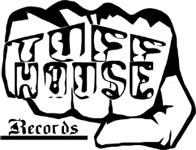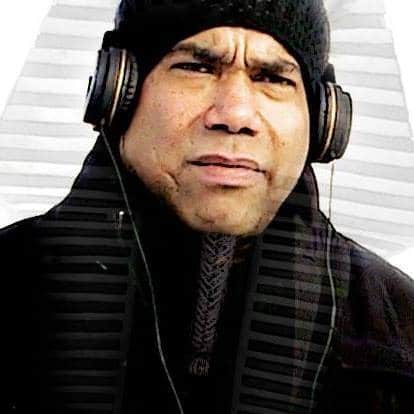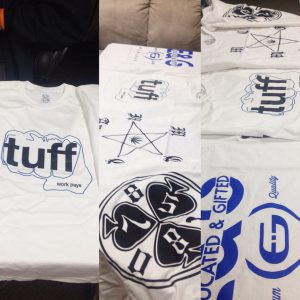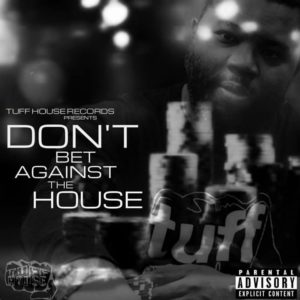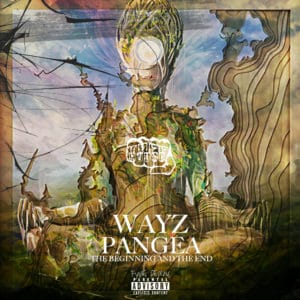Dre Pharoah | MC | Producer | Hip Hop Therapist | Hip Hop Cultural Specialist | Executive Director/Co-Founder, Cipher5 | “The Keeper”
Can you explain to us why you call yourself “the Keeper”?
There’s a group of Ethiopian monks, and they sit in the monastery. What they do is they are in a cipher, and they’ve been continuing this prayer for two thousand years. They’re the keepers of a certain faith. They’ve been keeping the essence of a spirit alive for two thousand years. I consider myself to be like one of them, but in the context of hip hop in its pure spiritual form. I consider myself to be “the Keeper,” in addition to everything else
How long have you been in the Edmonton hip hop scene?
I guess it’s been since 1983, when hip hop kind of exploded here in Edmonton. I became a breakdancer the very moment that Beat Street came out. I took my journey through graffiti, I threw up some of the first big pieces in town. I started rapping in 1987 with one of my friends, MC A-Okay. I mean, we kind of, y’know, started it. We were the first rappers that we knew of, outside of Toronto. We were part of the original wave around the world, and part of the first graduating class of MCs here in town, for sure. The scene and the community is definitely part of a labor of my love, and we were definitely the first two out here. We are very proud to have kind of put Edmonton on the scene and on the map. When we released with Capitol Records on the compilation album, that was very popular and went gold. We were the first city making a contribution to hip hop in Canada outside of Toronto. We wanted the world to know we were current and on par, and that album, “We United to Do Dis,” we put it out under the collective, “Simply Majestic,” back in ’91, it gave us the vehicle to do just that. It made us known [laughs] my name was Point Blank, and I was just starting, now that I look back on it. Those were amazing times, for sure. We were doing huge things, and I don’t think we even knew it, yet
What’s your favorite food?
Oh geez, my favourite food. My favorite physical food is a Jamaican dish, oxtail and dumplings. All about the oxtail. My favourite spiritual food is love, y’know? It nourishes me. And if I answer for both my physical body and spiritual self, don’t be confused, but I really identify myself as a being of light
What’s your favorite city?
Um, that’s a tough one. I have a few. My favourite as far as its unique culture is Montreal; as far as social consciousness and having a progressive and friendly nature, Edmonton, and the most beautiful place I’ve ever been to is Lake Louise, Alberta
Who’s your favorite artist of all time?
My favourite artist of all time is Chuck D, from Public Enemy. He has a new group called Prophets of Rage. He’s the perfect example of social responsibility, lyrical skill, longevity, and academia – balanced with street style. He’s at the top of the ladder, in my opinion
What musical trend would you like to see end right now and never, ever come back?
There’s two and they exist within hip hop. One is the tainting of our generation through trap music; I feel like, the message in trap music is there as a tool of oppression. If there’s not a message of how to cope or overcome those kinds of conditions, I feel like it’s just there to reinforce the condition. Also, the nonsensical lyrical content – it’s just mumbling, English isn’t even the mode of communication anymore. There’s no other content beside this gargling. I feel it’s the ultimate disrespect to hip hop and dumbing down of a generation
What’s been your favorite collaboration to take part in so far?
Musically, I think the collaboration with Simply Majestic and Capitol Records was my most important, as far as what it did for Edmonton as a scene. It put us on the map internationally. I’m not tooting my own horn here, I’m a product of the village. It takes a village to raise a child, but I know that we – Edmonton, we definitely arrived in 1991 when that album was released. Academically, as far as hip hop academia, my most important is with Professor Dr. Michael McDonald, and his research surrounding hip hop pedagogy at the Macewan University Department of music, and I continue to do some amazing collaborative work there partnering in research. Therapeutically, it’s definitely with Steven Leafloor of Blueprints for Life. That’s for the work we’re doing in youth correctional facilities. And of course, with Don Welsh, of Hip Hop in the Park, who co-facilitates with me at Cipher5.
Who are three artists you would you like to work with in the future?
Damian Marley, Talib Kweli, and this rapper, Locksmith
What made you want to be a part of hip hop?
My call to hip hop it, was passed on to me from my father, who was a reggae musician. In my DNA, I feel like there was a responsibility to keep the original function of hip hop alive. Hip hop is a result of the best practices of many cultures around the world, but most importantly, it’s a direct gift from the Maroons of Jamaica, who would do this thing in local towns, where they would stand on the corner and talk publicly about the dangers of colonization and the journey of self to enlightenment. They called it “warning”, and the warners would stand on the corners and do just that – warn, vocally, strongly, and publicly. When recording equipment became available, they got in the booth and started to warn over reggae music. This was the birth of what we now know as hip hop music. Hip hop, I think, is a response to oppression, and true hip hop should liberate, not enslave
What’s the advice you’d give to somebody who wants to follow in your footsteps?
Be fearless. And operate yourself outside of the need of approval from anyone
What’s the best part of your job?
Best part of my job is watching youth find their voice through MCing and um, watching them becoming their greater self through a process I like to call “megamorphosis”. Watching a youth who’s been silenced their whole life make that journey into dropping ill verses is a phenomenal thing to bear witness to
What’s the hardest thing about your job?
Maintaining my own mental and spiritual purification in order to do my job authentically. Attunement is a daily practice, an hourly practice, of y’know, staying connected to the highest source of love and knowledge that exists in the universe
What inspires you, in general?
There’s a full spectrum of inspirations, I think, as we walk through life. Sometimes, rage; others, love. Sometimes I’m inspired by joy; and sometimes, y‘know, sadness. The human experience has so much inspiration, I don’t think I can say it’s just one thing
What’s your favorite color?
Love
What other styles of music inspire you?
Definitely reggae; um, I’m inspired by folk music, by some of the more sophisticated metal and punk, and most importantly, I’m very inspired by tribal music – in particular West African and First Nations tribal music
What are three artists you’ve got bumpin’ right now?
Chronixx, Bob Marley, and Talib Kweli’s Reflection Eternal
Are there any myths about the industry you’d like to dispel?
Just give me a moment to consider this one, it’s a good question though! Um, okay, I think that you don’t have to sell your soul to find success. You don’t have to sign yourself away to a corporation in order to build a career. That we can build a career without buying into the glamour of big labels. That it’s okay to be a grassroots artist, to be someone who doesn’t tour – and you can still be considered successful. There’s a myth that if you have a video and an album under a major label, that you’re a dope MC, and that’s just not the case. It’s only like 2% of hip hop that we see commercially. The other 98% happens in basements, on the streets, and in cyphers worldwide, and I believe that’s where the best, the dopest hip hop exists. Not in the commercial stuff, for the most part
Is we finish, or is we done?
In the words of Jimmy Castor, “It’s just begun”
What, to you, is ‘Living the Dream?’
Free of ego, walking on Earth while in the God Worlds, where you get to experience love each day, all day long. Where your music carries that vibration of love; goes out to the universe and takes humanity up a notch each time your song is played or your name is mentioned. This is the dream
Any shoutouts?
Yeah, I just wanna say shout outs to all my peeps from Cipher5, and a big shoutout to everyone who’s reading this. May the force be with you [laughs]
Bonus Question: With the legalization of marijuana at the helm of North American politics, what do you have to say about legalization vs. decriminalization, and the war on drugs, in general?
I come from a Rastafari family, so my perspective on marijuana is that of sanctity. Marijuana is not used, in Rasta culture, like it’s used in North America. Marijuana is prayed upon, used in the ceremony of communion with Jah, right? So as far as legalization, I don’t acknowledge the authority who said it was illegal in the first place – to me this is not an issue. I believe that the prohibition of marijuana is about wealth. It’s about Forestry Canada keeping its wealth around products of paper and whatnot. And, hemp, it yields as much paper as trees do, I just, y’know – I believe it’s all about greed and wealth. Now; legalization is coming, because we need the trees to combat the greenhouse effect – and that comes with the need for a new source of paper, so legalizing marijuana brings hemp with it, too. I believe there’s a myth that everyone’s just gonna smoke pot and it’s gonna become a “good times hippy fest”, but all I see in the future is skyrocketed marijuana prices, and no one being able to afford to smoke anymore. Hopefully people will be allowed to grow in their own houses. I don’t smoke weed, so I don’t really care, but I care about our right to be able to smoke it. It’s making people healthy, it combats cancer…that’s important.That’s valid, and I support that.
The war on drugs is a decoy. There’s no way that cocaine can make it here from Columbia without the help of government, there’s just no way. I look back at the ghettos, the housing projects created in the 60’s and 70’s, then flooded with drugs. So the government created this ghetto housing, and then they were also responsible for the drugs on the street corners. How can the government be at war with itself on drugs? It makes no sense to me. I mean, the abuse of drugs isn’t good, but abuse of anything isn’t good. Again, I don’t do drugs, but I know they’re a major party of our economy. Governments need drug addicts to keep funding the machine. I don’t think it’ll ever disappear., it makes too much money
Bonus Question #2: What is your opinion on how best to handle the recent wave of racial intolerance, violence, and injustice that has been on the rise in North America? Do you feel that as a hip hop artist, you have any responsibilities in this regard? Why or why not?
This “recent wave” is 700 years old. So, the only recent thing, is its visibility in social media. My people, of Africa, have been fighting this wave since the ships first came to the shores of Africa. This is nothing new for us. This is nothing new for the ninety eight million First Nations people murdered in the last 400 years as those ships showed up and started subjecting the First Nations people of North America to the same horrendous crimes that they’d been facilitating in Africa. What seems new is a sense of Euro-American accountability and shame, surrounding those ships and those genocides. That shame, is a very important dialogue in the utopian idea of post-colonialism.
At Cipher5, I surveyed 30 of the students. I said to them, “who do you model your self, your beliefs your behaviors, and your values after the most? Your favourite high school teacher?” A couple hands went up, then I continued, “Okay, how about your spiritual leader, priest, or reverend?” A couple more hands went up, then I asked, “okay, how about your favourite rapper?” Every hand went up. MCs are more powerful than educators and spiritual leaders combined. We have the power to shape a generation, and in shaping that generation, I believe we have moral, ethical, and social responsibilities. This is where the distinction between the MC and the rapper really comes to life, because the rapper serves the interest of corporations. The MC serves the interest of his community; and most time, the interests of the corporation is at odds with the needs of the community. There really is a silent conflict between the rapper and the MC. I believe the MC has the power to change the world, and how the world thinks. I also think we have a responsibility to create a better world. A world of love, tolerance, peace, and harmony
